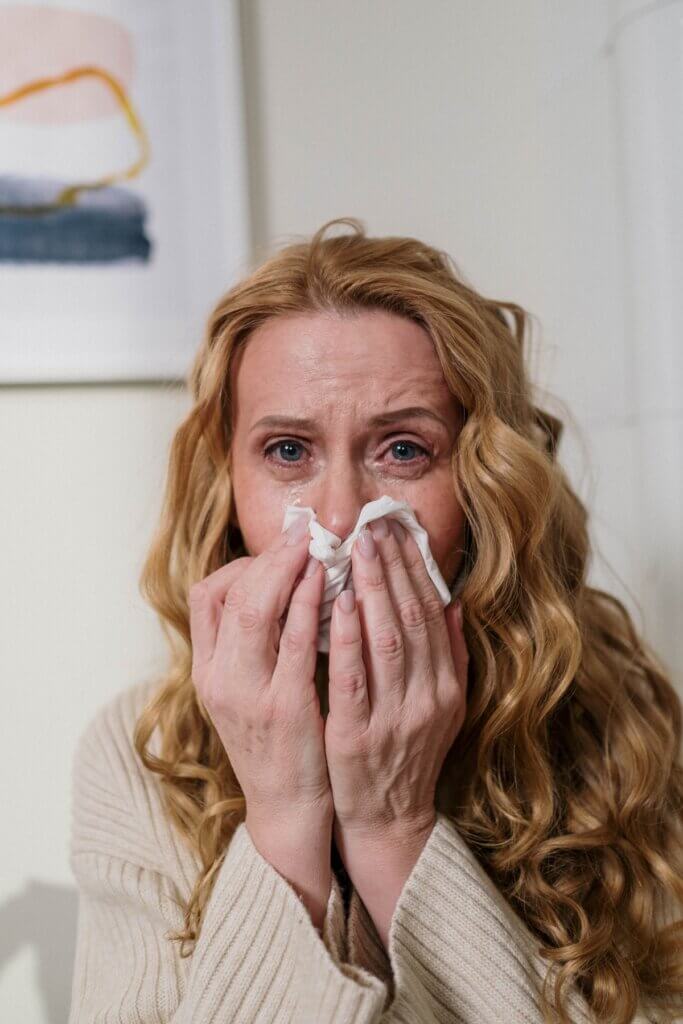You’ve all seen the statistics about the rise in the number people with allergies but we tend think of young children as the most at risk. However there are a growing number of people who find that after a completely allergy free life they suddenly, in their late 70’s, 80’s or even 90’s develop allergies, eczema, psoriasis or asthma.
Why are more old people getting allergies?
There could be a number of reasons. The slowing down of life, less movement and exercise, giving up work or perhaps losing your life partner, which will cause stress and anxiety. Maybe, with age, the body just loses some function or ability to recognise foods… Whatever it is, it can be a bit of a shock when suddenly you can’t eat your favourite sandwich filler, can no longer rely on an egg for a quick easy meal or cannot easily order meals-on-wheels because they all contain something that makes you sick.

Added isolation, sight and mobility issues make it harder
Consider also that many of our aging population are finding themselves isolated in communities with fewer bus services; they can’t just nip to their local health food shop or suddenly grasp internet shopping to find foods suitable for them. Many of them probably also don’t have the money to buy the more expensive gluten free bread nor the energy to hunt around for suitable foods minus their new allergy.
They probably can’t even read the tiny print on food labels to tell what’s suitable anyway! If I’m honest I struggle myself sometimes.
I wonder also whether doctors don’t take this seriously. Children are referred to an allergy specialist but are older people just left to get on with it because they come from a generation of people who do just that. Don’t complain, couldn’t possibly consider asking for help and are quite alright thank you very much.
Here are just a few stories of people I know or have spoken to who have experienced allergies for the first time in later life.
Don, 70 years old and never had an allergy in his life

Don (my Dad) worked as a builder and decorator all his life. He had a fairly active career involving heavy work and long days. He also played football and refereed well local matches well into his 60s. Suddenly, in his late 60s, his skin became so sensitive he now has to think about which washing powder to use and which shower gel and soap will not aggravate his skin. He can no longer eat peanut butter for his lunch every day because his body has decided enough is enough. Luckily for Don he recognised the symptoms (probably, being my Dad he couldn’t really fail not to) and has been able to get to a situation where he can tolerate his most favourite of all foods occasionally and does not have a serious peanut allergy. After years of watching me suffer with hives, eczema and painful itchy skin he suddenly has it himself; he has a new understanding of the years of suffering me and my sister went through and is learning what triggers his outbreaks.
Vera, 87 years old and never had an allergy in her life
Vera grew up in the countryside, raised a family and enjoyed dancing, cooking, baking and being outdoors. She sadly lost her husband just over a year ago. This was very painful for her as they were incredibly close, did everything together, and his illness and passing were both sudden and shocking. She has now developed quite wide spread psoriasis on her arms, elbows, hands and scalp. It looks unsightly, itches a great deal and leaves huge flakes of dry skin when she has a good scratch. She is finding it hard to manage but doesn’t complain. None of the creams and emollients the doctors have been giving her are making very much difference. She uses olive oil to reduce the dry patches around her hair line and after trying Shea butter has found some relief as it reduces the dryness and redness. Her psoriasis isn’t going away though, it keeps coming back. Vera is learning to manage this condition but doesn’t like to bother the doctors. She now lives on her own and whilst she is mobile she can’t walk far so doesn’t really leave her house much. She hates to complain and doesn’t like to bother her doctor, so why has a woman who has enjoyed what could probably be described as ‘rude good health’ all her life suddenly develop dermatitis? She has also discovered that she can no longer tolerate carrots. They make her quite ill, so this means that she is worried about whether she will be able to order meals-on-wheels, as most of the dishes contain carrots.
Barbara, 93 years old and never had an allergy in her life
Barbara also recently lost her husband and moved from a large house to sheltered accommodation some way from the town where she lived most of her married life. She is now closer to her daughter and is enjoying her life but suddenly, out of the blue, she has developed a serious allergy to eggs. She can’t even touch an egg now, a food she used to enjoy as a quick, healthy meal. She now fears that she is beginning to have problems with dairy too and is experimenting with soya milk to see if this brings her some relief. One of her simple pleasures was a cappuccino every day and she is really missing them and finds ‘black coffee takes some getting used to’. She has developed quite painful eczema and thinks that certain foods are contributing to its severity. She has never had any allergies before, so why is this happening? Her doctor told her he has ‘never seen someone in their 90s who suddenly got food allergies’. Not the most helpful comment but probably true, though Barbara is clearly not alone. She has been referred to an immunologist but the long wait for a local appointment meant that going private has secured an earlier appointment. Hopefully she will find some answers.
They didn’t have allergies in my day!
People of this generation may also be the first to say, “They didn’t have allergies in my day!” despite the fact that there certainly have been incidences of allergies going back hundreds of years. They were still rare back then – they are now certainly on the rise and sadly still very little understood.
Imagine having to eat your words in old age, suddenly finding you are the fussy person you loved to ridicule with the ‘not in my day’ comment. Allergies can strike anyone at any time and without warning.
We do know what’s happening but not why and not how to prevent future generations from continuing to develop more and more allergies.
Allergies are all in your head…
Some nay sayers would have us believe that this is all in our heads but those of us living with allergies know that is not true and also know the sheer relief when problem foods are identified. So why would the human body suddenly begin to reject certain foods? What is it about these foods that cause such violent reactions in our bodies? How do we address this growing problem and most importantly, how do we ensure that vulnerable people who are less able to access internet chat rooms, forums and blogs like this can get the advice and help they need.
Studies into late onset allergies and dermatitis
It seems that Don, Vera and Barbara are not alone. I found some interesting research which may interest any of you who would like to read further. Perhaps your mother, aunt, grandmother or yourself are experiencing allergies for the first time as an adult and would like some understanding about why. There have been a number of studies into this area so clearly it’s not totally new.
Adult-onset food allergy
by Kivity S. Source: Allergy and Immunology Institute, Tel Aviv Sourasky Medical Center, affiliated with Sackler Facuty of Medicine, Tel Aviv University, Ramat Aviv, Israel.
The Israel Medical Association Journal, 2012 Jan;14(1):70-2. allergy@tasmc.health.gov.il
Abstract: The prevalence of food allergy is increasing in both the pediatric and adult populations. While symptom onset occurs mostly during childhood, there are a considerable number of patients whose symptoms first begin to appear after the age of 18 years. The majority of patients with adult-onset food allergy suffer from the pollen-plant allergy syndromes. Many of them manifest their allergy after exercise and consuming food to which they are allergic. Eosinophilic esophagitis, an eosinophilic inflammation of the esophagus affecting individuals of all ages, recently emerged as another allergic manifestation, with both immediate and late response to the ingested food. This review provides a condensed update of the current data in the literature on adult-onset allergy.
New onset egg allergy in an adult
By Unsel M, Sin AZ, Ardeniz O, Erdem N, Ersoy R, Gulbahar O, Mete N, Kokuluda? A.
The Journal of Investigating Allergology and Clinical Immunology, J Investig Allergol Clin Immunol. 2007;17(1):55-8.
Source: Ege University Medical Faculty, Department of Internal Medicine, Division of Allergy and Clinical Immunology, Bornova-Izmir, Turkey. unselmehmet@yahoo.com
Abstract: We report newly presenting systemic and local allergic reactions to egg in a 55-year-old woman. The patient did not have a history of egg allergy in childhood or occupational exposure to egg proteins; nor did she report any disease that is known to be related to food allergy. A skin prick test with commercial extracts, prick-to-prick test, CAP radioallergosorbent assay, and a double-blind, placebo-controlled food challenge test were used to prove egg allergy. Because egg allergy mainly affects children and symptoms frequently disappear with age, the late onset in this patient is rare.
Old age onset of food allergy
Allergen Bureau, Wednesday, 03 March 2010 12:35
Most studies that report an increasing incidence of food allergies focus mainly on children and young adults. Researchers at the Medical University of Vienna in Austria have looked at food allergies in the elderly and suggest prevalence may be underestimated in this age-group.
Immunosenescence, or dramatic age-related changes to the immune system, may contribute to the development of allergies in geriatric patients, as may deficiencies in micronutrients such as zinc, iron and vitamin D. The researchers also suggest the impact of atrophic gastritis or anti-ulcer medication on the digestive ability of the stomach as a further risk factor for developing food allergies later in life. They say in these settings, undigested proteins may persist and become allergenic.
Reference: Diesner et al. Gerontology. 2010 Jan 29
We can see that it’s rare, but it’s happening more and more. Adult onset allergies are on the rise, just as allergies in kids and young children. Anyone who has tried to get a referral to an allergy clinic will also know that the health service is already struggling, it’s probably not going to be able to accommodate a load of allergic pensioners on top of all the kids and adults who are joining this allergic march.
I really feel for people like Vera and Barbara, who at their time in life are less inclined to have the energy to search for the answers. I pray that this doesn’t mean people like them will be overlooked, just left to get on with it and not given the right help. I really worry about anyone in an old people’s home who develops allergies. Would anyone understand what was going on? or would the poor geriatric patient be continually fed the food that might eventually bring on their early death? A very worrying thought. Not many of the old people’s homes I’ve visited would be equipped to deal with this sort of thing.
I’d love to hear from any silver surfers who are experiencing allergies in later life or from their family who are searching for the answer on their behalf. I don’t have the answer but I can assure you that you are not alone.
Photo by cottonbro from Pexels












I have allergies to gluten, all nuts, all fruit, all raw vegetables, all pollen, latex; and the list keeps growing.
I never had allergies in my life until my late twenties and every year I become worse. NHS ahs just told me to be careful and avoid anything I’m allergic to.
It is possible that working on GM field trials started the problem as my hayfever started at exactly the same time. However, getting anyone to take this seriously and do tests that could prove this is impossible.
That is a scary thought isn’t it? I avoid ALL Gm foods but often you don’t know it is GM. What are all these GM crops doing to us? Hayfever can cause Oral Allergy Syndrome where your body sees certain fruit and vegetable as they have similar cell structures. I am allergic to all nuts (born with that one) all dairy (born with that one but not diagnosed till much later, Tomatoes, celery, coriander (Fresh), Soya (milk), Latex, Dust (probably my worst allergy), pollen, grass, some herbs, and the list keeps getting longer… What will be left to eat?
Could it be that those who thought they never had an allergy did, but didn’t recognize the mild symptoms? I thought I never had an allergy until an anaphylactic reaction as an adult, but then when I learned about allergies, we realized I had had milder symptoms all along. those symptoms had been attributed to other causes.
Could it also be that when people say that there were no allergies in their day, it’s because people died? We have a family member who died of a bee sting, but no one realized there were allergies in the family. Nowadays, symptoms might be recognized and that person would have had an Epipen.
Yes I totally agree and skin problems, IBS and asthma can quickly turn into anaphylaxis with no warning! and certainly deaths would and still are often registered as heart failure or asthma instead of allergies.
I’m worried about being older and going into a home, and possibly losing my marbles and having to rely on others to manage my allergies. I know from experience, I can only trust myself to keep myself safe. Others are much more likely to think I should take risks are are “sure” something will be fine for me to eat. It would be awful if I kept myself alive for years, with constant vigilance, only to die of a reaction when I can no longer care for myself.
Yes I really worry about the care of the elderly in this house. I hate to say it but anyone with anaphylactis could be at risk esp if they coukdnt speak out or had dementia or no family to look out for them. Very sad and worrying!
I just found this article , Allergies are not just for kids http://6thfloor.blogs.nytimes.com/2013/03/13/allergies-arent-just-for-kids/ which details another lady with adult onset oral allergy syndrome and another who is now limited to only four foods that she eat. Not everyone grows out of their allergies, for some of us, they get worse as we get older, and for others they creep up to bite us in our 20’s, 30’s and older with no warning. So just watch out, if you are an allergy sceptic and don’t believe they exist, pray you don’t wake with an allergy because it could and can happen to anyone.
Just had to share this excellent article from Alexa Baracaia http://www.high50.com/health/allergic-reactions-food-allergy-in-later-life
I felt sickish for a few years (GI problems) but I never could attribute it to anything specific. When the symptoms started getting constant I was getting worried. Then I thought of eggs which I ate almost everyday. I quit eggs and felt better — had a lot less GI problems. After about 3 weeks, I tried eating eggs one meal and the symptoms were back! This is enough proof for me without getting allergy tests. I am now 67 years old. (BTW: I have been taking prilosec for many years constantly-wonder if there is a connection.)
WOW I’m so sorry I never spotted this comment SIX YEARS AGO! Oh my, catching up on blog admin. Well done on the detective work. Who knows what the long term effect of drugs can be on our body. It could be Prilosec… I’ve no idea.
I have a new allergy to eggs, wheat, and milk that just happened in the past week and I am 57 years old. I got a lump in my throat when I ate each of these and became short of breath. I’ve never had asthma or any allergies of any kind. I am an ER nurse and think I may have just got over the coronavirus. . My doctor said that a recent virus may have caused the allergies this late in life. Now have the EpiPen and Benadryl on hand.
Oh gosh! Never heard of a virus causing allergies, but I guess it would have had some effect on your immune system. Keep doing what you do. All of you nurses and NHS staff are amazing and so glad to hear you got over coronavirus. So far I have managed to evade it.
I did not know that allergies can pop up at any point in time of your life, seems unfair. Learning how to manage these symptoms is important, especially in seniors. Thank you for sharing this. I did some digging about seniors and allergies, and read that Medicare will cover some allergy testing, as long as it is necessary. https://www.ez.insure/landing/2020/10/medicare-and-allergy-testing/ It is a good read and I think older adults should read this and get tested is they have any suspicions, it could save their lives. notify others they have them, and allow them to learn how to manage it themselves as well.
They can happen at any time in your life but this is less common. Frustrating though as it can be harder to come to terms with. Labels are harder to read too when you need reading glasses! Thanks so much for the comment.